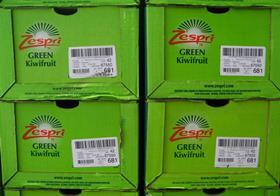
International kiwifruit marketer Zespri has revealed it is experiencing huge demand for its products this year in Asia despite the global economic downturn.
A positive performance for its New Zealand kiwifruit exports has seen the company achieve an increase in overall worldwide sales of over 1m trays as of the end of July compared with the same time last year.
The company said it had already sold 43 per cent of its Green crop, compared with 42 per cent last year; 37 per cent of its Green Organic volumes, against 41 per cent last year; and 83 per cent of its Gold crop, up from 73 per cent last year.
'As long as current run rates continue to be achieved, a tidy finish to the selling
season is expected,' said a spokesperson. 'From a pricing perspective it is still anticipated that industry returns will be within the indicative bands published in May.'
In all three of its key marketing regions in Asia – Japan, East Asia and South East Asia – the company said it had seen deliveries to customers increase during 2009 compared with the year-earlier figure.
Japan
In Japan, sales were reported to be up 7.7 per cent on 2008, a result attributed to a strong start to the New Zealand export season as well as good overall taste and quality for all Zespri-branded kiwifruit.
Television and media advertising campaigns combined with consistent early supply had also enabled the group to boost its Japanese deliveries, the company said.
'The challenge now is to maintain momentum as summer fruit volumes increase,' said a spokesperson. 'Increasing competition was felt from June, with banana arrivals rising 37 per cent, resulting in large stocks at terminals and a lower wholesale price, which dropped from Y2,100 to Y1,200 per box.'
Overall domestic fruit sales at wholesale in Japan are reported to be running 11 per cent higher this year than in 2008, while prices are down 8 per cent, Zespri said.
'In July, peaches and watermelons were key among the summer fruit volumes. As the temperatures have increased, so have the sales of juicy fruits and drinks.
Now that Zespri's Gold kiwifruit television commercial has finished its run in Japan, the company is now working on the production of a new, animated Zespri Green commercial due to air in September. Supermarket sampling, public relations activities and media advertising are set to continue.
East Asia
In East Asia, meanwhile, sales of Zespri Green kiwifruit were tracking 19 per cent above last year's level, with Green Organic sales 530 per cent ahead and Gold sales 10
per cent up, the company revealed.
In Taiwan, deliveries were 19 per cent above 2008, but with lychees, peaches, Asian pears and watermelons all selling at record low prices and US cherries said to be oversupplied and selling at prices below Zespri Gold kiwifruit, the market remains extremely competitive. Chilean kiwifruit exports, however, were noted to be up 20 per cent year on year.
In terms of its marketing activities, television advertising continues to air on cable and terrestrial television and, as in Korea and Hong Kong, the Japanese kiwifruit diet book is being launched in Taiwan. Zespri was also one of the sponsors of the World Games held in South Taiwan from 16-29 July 2009.
In China, deliveries were reported to be more than double those made in 2008. In Hong Kong, arrival volumes were 34 per cent ahead.
According to a spokesperson, a 10kg box of Chilean kiwifruit was selling at wholesale in China for approximately Yn100, compared with Zespri kiwifruit at Yn80 for 3.6kg.
'Sales in China’s tier two cities are going well due to good support from television advertising, outdoor displays, sampling and other marketing activities,' the spokesperson added.
South-east Asia
In south-east Asia, sales of Zespri Green kiwifruit were tracking 46 per cent above 2008 levels and Gold sales were 65 per cent above 2008, the company continued.
'Sales volumes are slowing over the summer period as low priced, domestic tropical fruits arrive in the market,' a spokesperson said.
Chilean kiwifruit imports were down 54 per cent on 2008, however, the spokesperson revealed, although more recent, larger arrivals were expected to narrow this gap.



